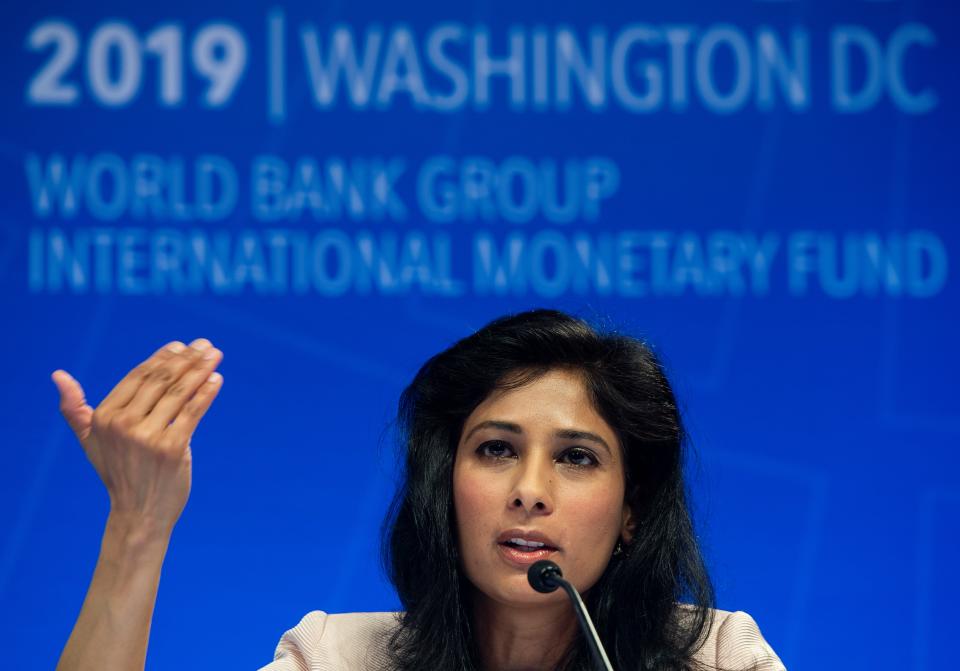'There is plenty to worry' about for global growth: IMF chief economist
Trade tensions have compounded with country-specific weaknesses to further mire the global growth outlook, said the International Monetary Fund’s chief economist.
“There are already a lot of factors weighing on global growth. Some of it is not trade-related, because some of this is coming from weaknesses in emerging markets, which depend upon their own country-specific factors,” IMF chief economist Gita Gopinath told Yahoo Finance at the Federal Reserve’s annual Jackson Hole symposium Friday. “But that combined with the trade tensions ... that really weighs on the outlook.”
In July, the IMF downgraded its global growth outlook for both 2019 and 2020. Based on the institution’s latest projections, real global growth will slow to 3.2% this year and pick up to just 3.5% in 2020, with both projections 0.1 percentage points below the IMF’s estimates earlier this year. The IMF in July noted that risks to the forecast were skewed “mainly to the downside,” in large part due to trade.
And while the U.S. economy has so far remained strong in comparison to other economies, global concerns could soon broaden out into real domestic problems.
“If you look at the fundamentals of the U.S. economy – and given that is quite a consumption-driven economy – that looks healthy and strong,” Gopinath said.
Data on the U.S. consumer has held up, with the most recent reading on personal consumption expenditures (PCE) rising the most in six quarters during the second quarter this year. July’s retail sales surpassed expectations, and big-box retailers have posted estimates-topping quarterly results.
“The headwinds that are going to come will come from what's happening with global growth,” she added. “And there is plenty to worry [about] over there.”

Gopinath’s comments come on the heels of remarks from Federal Reserve Chair Jerome Powell at Jackson Hole, who said the U.S. economy was in a “favorable place,” but that “significant risks” still loomed. He added that the Fed had “no recent precedents” to guide Fed policy in the face of whipsawing trade policy.
“These are quite uncertain times. And the data that’s coming in especially on the trade front, on manufacturing and industrial production remains very weak,” Gopinath said, while acknowledging the services sector has provided “some respite.”
“I think these factors are weighing on what monetary policy is going to do going forward,” she said.
Strong dollar
The relative strength of the U.S. economy has also pushed the dollar higher, as investors turn toward the less risky asset amid global softness, Gopinath added.
But the strong dollar has sparked ire from President Donald Trump, who has called on the Federal Reserve to lower interest rates to help bring down the value of the dollar. The value of the dollar is driven in part by interest rates, with lower rates typically weakening currency and supporting risk assets like stocks.
Trump has maintained that the dollar should be lower to put the U.S. on more equal footing with other countries and their currencies, as goods from a country with a weaker currency are cheaper and therefore more attractive to others in global trade.
But Gopinath refuted that lower rates would necessarily achieve this outcome.
“There’s many other factors that impact the level of the dollar,” Gopinath said. “The strengthening of the dollar also has to do with the fact that the U.S. economy is growing at a much more healthier pace than most other advanced economies are.”
“Whenever there is an increased appetite for safety, investors move towards dollar assets, and that's causing the dollar to strengthen,” she added. So it’s not a direct recipe that...if the Fed was to do more by cutting rates, that would actually necessarily weaken the dollar.”
-Jillian Harding and Daryen Ru contributed to this report
—
Emily McCormick is a reporter for Yahoo Finance. Follow her on Twitter: @emily_mcck
Read more from Emily:
Economy adds 164,000 jobs in July, unemployment rate sits at 3.7%
Netflix’s 2Q global paid subscriber additions miss expectations
Tech companies like Lyft want your money – not ‘your opinion’
Follow Yahoo Finance on Twitter, Facebook, Instagram, Flipboard, LinkedIn, and reddit.
Read the latest financial and business news from Yahoo Finance

